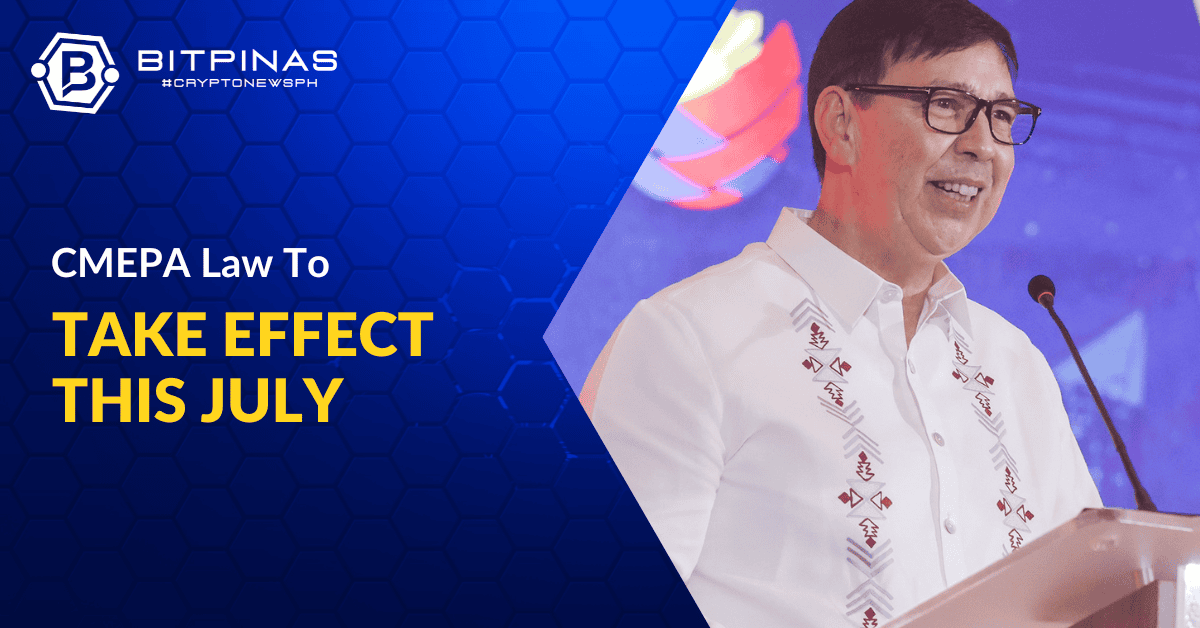Disclaimer: This article is for informational purposes only and does not constitute financial advice. BitPinas has no commercial relationship with any mentioned entity unless otherwise stated.
President Ferdinand Marcos Jr. has signed into law Republic Act No. 12214, or the Capital Markets Efficiency Promotion Act (CMEPA), a landmark measure aimed at reducing friction costs, streamlining tax structures, and strengthening investor confidence in the Philippine capital markets.

Photo from Presidential Communications Office
What is Capital Markets Efficiency Promotion Act?
Signed on May 29, 2025, and set to take effect on July 1, 2025, the law is seen as a direct response to the country’s long-standing issues of low market participation and complex tax regimes.
According to the official document, CMEPA is a law that aims to modernize and simplify the Philippine tax system to enhance capital market development.
It does this by standardizing the taxation of passive income, reducing transaction costs such as the stock transaction tax and documentary stamp tax, and aligning tax treatment with regional norms. The law supports financial inclusion and economic growth by making investing more accessible and attractive.
Lawyer’s Review on CMEPA
An analysis written by Atty. Abimelech Rigodon, a tax and capital markets lawyer and an associate at the Siguion Reyna Montecillo and Ongsiako Law Offices, provided insight into how the CMEPA is expected to impact investors, institutions, and the broader financial system.
According to Rigodon, there are currently only 10% of Filipino adults that hold investment products, partly due to high friction costs and a confusing tax system.
“While high trading volumes are generally attractive to potential investors, their appeal diminishes when friction costs are high. The existing tax structure in the Philippines poses a considerable obstacle to the development of its capital markets. For instance, the stock transaction tax (STT) is imposed at 0.6% of the gross selling price—significantly higher than the 0.1% levied in Indonesia and Malaysia, and the nil rate in Singapore and Vietnam.”
Atty. Abimelech Rigodon, Tax and Capital Markets Lawyer
Conversely, he stated that CMEPA addresses these barriers by aligning passive income tax rates with regional standards, simplifying tax structures, and lowering transaction costs, with the goal of boosting domestic investor confidence and enhancing the competitiveness of the Philippine capital market.
Key Provisions of CMEPA
Simplified Interest Income Taxation
All interest income from bank deposits, trust funds, and similar instruments will now be subject to a uniform 20% final tax, replacing a fragmented system that ranged from full exemptions to various preferential rates.
Stock Transaction Tax (STT) Reduction
To promote trading activity, the STT on listed shares has been cut from 0.6% to 0.1%, applicable to both domestic and foreign stock exchanges. This places the Philippines on par with countries like Indonesia and Malaysia and closer to Singapore and Vietnam, which does not impose STT.
Capital Gains Tax Alignment:
The law imposes a 15% final capital gains tax on the sale of both domestic and foreign unlisted shares. Previously, foreign shares were subject to higher rates depending on the taxpayer’s classification, reaching up to 35% for individuals.
Lowered Documentary Stamp Tax (DST)
CMEPA reduces DST on the original issuance of shares from 1% to 0.75%, and exempts mutual fund shares and UITF units from DST entirely—moves expected to encourage equity financing and small-investor participation in pooled investment vehicles.
PERA Incentives
Employers contributing to employees’ Personal Equity and Retirement Account (PERA) can claim a 50% additional deduction on top of the allowed contribution, capped at ₱100,000 annually. The measure is seen as a bid to stimulate long-term retirement savings.
Recto Backs Capital Market Law
In a media release from Department of Finance (DOF), Secretary Ralph Recto welcomed the enactment of CMEPA, calling it a landmark reform that will make investing more accessible for ordinary Filipinos and support inclusive economic growth.

Photo from Philippine News Agency
According to the finance department, CMEPA is expected to generate over ₱25 billion in revenue from 2025 to 2030 and help reduce the country’s fiscal deficit to 3.8% of GDP by 2028 under the Medium-Term Fiscal Framework.
“This is a major victory for the country, as inclusive access to investment opportunities and a broader, deeper financial system are vital pillars of long-term, inclusive growth. Bukod dito, ang buwis na malilikom ay gagamitin upang pondohan ang ating mga priority projects sa imprastraktura, kalusugan, edukasyon, agrikultura, at iba pang pampublikong serbisyo.”
Ralph Recto, Secretary, Department of Finance
In addition, Special Assistant to the President for Investment and Economic Affairs Frederick Go said the new law signals to global investors that the Philippines is serious about building deeper and more efficient capital markets.
“The passage of CMEPA sends a clear message to both domestic and global investors that the Philippines is committed to building deeper, more efficient capital markets. This reform is expected to boost and strengthen liquidity, trading activity, capital formation, and contribute to broader economic growth.”
Frederick Go, Special Assistant to the President for Investment and Economic Affairs
This article is published on BitPinas: CMEPA: How the New Capital Markets Law Will Lower Taxes and Boost Investments
What else is happening in Crypto Philippines and beyond?






